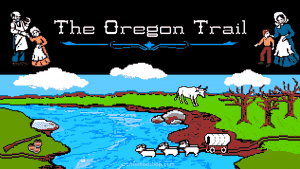I believe that fifth grade was my favorite year of school ever. And that’s saying something, when you’re someone who basically went to school nonstop until age forty.
I loved that particular year of school, though, because every single day for several months we spent an hour in the afternoon playing the game The Oregon Trail. I’ve learned that The Oregon Trail is now a computer game, but way back in the day, we played it old school. With pencils and paper.
The game is designed to teach players about the realities of 19th-century pioneer life. So we were divided into teams, and had to adopt the life situation of a group of settlers preparing to travel from Independence, Missouri, to Oregon’s Willamette Valley on a covered wagon in 1848.
Some of you who are familiar with the game will know that you start out with a certain amount of money and have to make investments in supplies—food, ammunition, items to trade—that you believe will sustain your covered wagon on the long and dangerous journey. Every afternoon in our classroom we’d gather in a circle to roll dice and draw cards that would determine how far we could travel that day, depending on the circumstances. Your wagon could get sick and have to decide to leave someone behind or drop out altogether. One of your oxen could die, slowing your wagon. The weather might snow the wagon train in for a month while food supplies dwindled. The camp might be attacked.
You get the idea.
The goal of the game was, of course, to make it all the way to Oregon with enough resources to claim land and settle there.
In fifth grade we played the Oregon Trail and learned about the history of America’s westward expansion. What we didn’t know then was that we were also learning that the systemic theft of land from native peoples is an American value, and that we’ve all been indelibly impressed with a kind of rugged individualism that informs our American psyche.
Well, I hate to be the bearer of bad news, but today Jesus is undermining modern American exceptionalism again, and the message we’re presented with should make us all deeply uncomfortable and, hopefully, convicted enough to take action.
If you’ve been here the last few weeks in worship, this should not surprise you. We’ve been “on the way with Jesus,” trying to imagine what it may have been like to be one of Jesus’ first disciples, those who had given up their lives to follow him. But Jesus was forever baffling them. He didn’t talk about political power or financial security, well, ever. He talked about taking up a cross and building beloved community and forgiving over and over and over again.
Some of the people who heard him walked away shaking their heads; Jesus’ strange ideas were never going to make Jerusalem great again. But some disciples kept listening, kept trying to understand, and kept tripping over themselves then getting up and trying again. If you’re in the second group—if you’re still on the way with Jesus, open to having your heart and your life changed by his challenging message—well, let’s listen closely.
Today’s gospel passage has been commonly titled, “The Parable of the Laborers,” and it appears on the surface to be a fairly innocuous little story. But as we know, titles can be misleading, and I find it’s pretty safe to say that if you read one of Jesus’ parables and feel vindicated or even comfortable, you’ve probably read it wrong. As Clarence Jordan said, “Whenever Jesus told a parable, he lit a stick of dynamite and covered it with a story.”[1] But let’s review:
“The kingdom of heaven is like…,” Jesus began, which meant something like: “The world that God imagines for us is like…”. A landowner, a landowner who needed some folks to work in his vineyard. Maybe the regular crew was on vacation, or didn’t show up…or maybe it was harvest and he needed all hands on deck. Whatever the case, this landowner went into the village early in the morning to find some laborers who would work in his vineyard that day. He’d pay them fairly—generously even—and so they came back with him and began the day’s work.
A little later that same day, the landowner could see there was quite a bit of work left to do and remembered the crowd of people waiting for an opportunity to work, so he went back into the village and found some more folks to come work. The same thing happened again at noon, then even late in the afternoon, around 5, when the landowner went into the village and invited still more laborers to come work in his vineyard.
When the bell rang for the end of the workday, the landowner instructed his manager to line everybody up to receive their pay for the day, the folks hired last, first.
So there they were, lined up to be paid, the folks who began at five PM at the very front of the line. As instructed by the landowner, the manger paid the first set of workers—those who had only been on the job just a few hours—a full day’s wage. They were probably surprised, but they weren’t going to complain!
So they made their way past the others waiting in line and word began to trickle out—the landowner paid the very last workers a full day’s wage! There at the end of the line were those who had started before the sun came up: they couldn’t contain their excitement. If the workers who’d only worked a few hours were paid a full day’s wage, well—they were set to make way more money than they’d anticipated. Jackpot!
So the folks who began at noon got to the front of the line and they were paid…a full day’s wage. And the folks who began at 9 am, again: a full day’s wage. Finally, the laborers who had been working all day long—for hours!—in the beating sun, sweating and dirty and tired to the bone—got to the front of the line. And, you guessed it: the manager paid each one a full day’s wage.
They were incensed. Furious. It wasn’t fair!
And perhaps this is how this parable has always been explained to you—as it has to me: it doesn’t matter if you come to God early or late. God has enough grace and forgiveness and generosity for everybody.
Perhaps I could just say amen here, and we can pack up and head out to our after worship activities…and that would be so nice. But don’t forget that when Jesus tells a parable, he’s lighting a stick of dynamite and covering it with a story. Let’s look again.
It might be a good place to start if we look at this parable in context, so if you want to turn in your Bibles you can look with me. Right before Jesus launched into this story, Peter, the disciple who always forgot to think before he spoke out loud, was busy pointing out to Jesus that they had given up everything they had to follow him—surely good enough to get some reward. And right after this parable, the mother of James and John—two other disciples—tried to get Jesus to promise her sons powerful positions in his upcoming administration. Everybody was thinking about me instead of we—what am I going to get out this whole thing?
So maybe Jesus’ story wasn’t what we thought it was. Let’s review: “The Kingdom of Heaven is like…a landowner.” A landowner. We thought the landowner in this parable was God, but what if the landowner is us? What if Jesus is asking that our lives be transformed in such a way that we live out the dream God has for the world, for our lives?
Because I don’t think Jesus was talking here about the question that seems to be consuming the laborers—what is fair and what isn’t fair. Instead, I think Jesus was talking about was is possible, about you and me shedding the constructs of this world that limit the ways in which we interact with each other and the world around us, about opening up possibilities for wholeness and generosity, expansiveness and relationship that perhaps we’d never considered.
After all, it’s the landowner here who is behaving in a new way—not the laborers. It wouldn’t make sense at all for an employer to set up a system of compensation that doesn’t reflect hours worked. You’d never be able to find laborers to work in your vineyard if you did that! How could you motivate employees or produce product or make a profit? This doesn’t compute, and it surely doesn’t align with our good rugged American individualism and Protestant work ethic.
Stick of dynamite, remember?
Jesus is saying here, “The kingdom of heaven is like…a landowner…” who finally realizes that everything he has—his money, his influence, his power, his business—does not belong to him. The only thing that belongs to him…is his neighbor. The only thing that belongs to him is his neighbor.
The ONLY thing that belongs to us is our neighbor.
As some of you know, I grew up in the Hawaiian Islands, daughter of a native Hawaiian activist and community organizer. I don’t often speak Hawaiian in the pulpit or talk about the rich heritage that formed me, but today is our fourth Homecoming Sunday together, and it’s probably time you knew a little more about the culture of my island home, as it was implanted on my psyche right along with all the lessons I learned playing The Oregon Trail. In short, island communities have a unique way of living together, perhaps for the simple fact that when you live on an island you have to figure out how to get along, to take care of each other…or everybody dies.
My father taught us that there is no word in the Hawaiian language for “right,” as in “this is my right,” or “this is what I deserve.” The only word in the Hawaiian language for talking about what belongs to me is “kuleana,” which means “responsibility.”
The island community was driven by a sense of responsibility to each other, because when we start thinking about our “rights,” about personal acquisition over the sustainability and flourishing of the whole, that always, always leads to the death of the community. The ancient Hawaiians knew that they lived in a fragile environment that only could prosper if they paid attention to our “kuleana,” our responsibility.
Jesus knew this too, which is why he told the story of the landowner and insisted that the question we should always be asking is not, “What is fair?,” but rather, “What is possible? What is possible for us all, when I remember that the only thing that really belongs to me is my neighbor?”
A fragile environment…hmmm. That sounds familiar. The world we live in is rife with fragility; it hurts to read the news, and that’s just the truth. The times in which we’re living make us want to hoard what we have and close our doors and build big walls and use nuclear codes and make sure I don’t have to pay for anybody else’s healthcare—instead of looking at ourselves and our responsibility, we let fear divide us from each other.
But when we’re on the way with Jesus, we don’t ask the question, “What is fair?” anymore. Instead, we think about our “kuleana,” about what is possible, and we invest generously in the life of justice-making communities like this one, and we turn down invitations, and take a knee, and risk our livelihood, and name the evils of systemic injustice, and insist that DACA continues, and muster all the resources we can for folks devastated by natural disasters, and generously contribute to good healthcare for everyone, and work to heal and protect our earth, and so many other things because we know that the only that that belongs to me and the only thing that belongs to you…is our neighbor…is each other.
In 1959, when Hawaii became the fiftieth state in these United States (speaking of systemic theft of land from native peoples), the new state chose as its motto this phrase: Ua Mau ke Ea o ka ʻĀina i ka Pono. “The life of the land is perpetuated in righteousness.” “The life of the land is sustained in right-ness.” “The flourishing of our shared lives only happens when we exercise our responsibility toward each other.”
Or, as Jesus might say it, “The kingdom of heaven is like a landowner…,” “The kingdom of heaven is like a landowner who looked out over all that he had and realized that the only thing that really belonged to him…was his neighbor.”
We’ve come home to this community today and Jesus is asking us to be justice makers in the world by turning inward first and asking ourselves: “What belongs to me?”
Then turning outward with open hands and open hearts because we know that the only thing that truly belongs to me…is you.
Amen.
[1] http://day1.org/8019-on_scripture_imagining_economic_justice_matthew_20116_by_thomas_g_long













